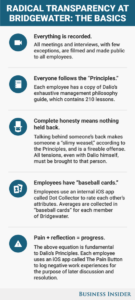Bridgewater’s Ray Dalio has been pushing back against the media portrayal of his firm; the latest is a skirmish caused by a recent WSJ article about the firm (his response was posted on LinkedIn). Henry Blodget of Business Insider — and a prior MiB guest — had a multi hour conversation with Dalio, by phone and by email Q&A. He posted the results at BI.
I met Dalio some years ago at a Bloomberg conference at St. Bart’s Church. (Its a funny story, remind me to tell write it down one day). I thanked him for being the inspiration for the annual mea culpas (see this, this, and this).
He and Jim Simon are my white whales, who I know would be great on Masters in Business.
Below are a few excerpts, but the conversation is worth your time to read in its entirety.
Henry Blodget: Ray, you recently said the Wall Street Journal intentionally distorted the truth about Bridgewater. What do you think the Wall Street Journal intentionally distorted?
Ray Dalio: I think they wanted to create a picture of a weird, oppressive place in which weird things are going on, rather than a place in which there’s a lot of hard work and high standards and an unusual culture that works very effectively. The media has the power to create an entrenched perception of reality that’s incorrect. Many times people will be quiet about that. I wanted to clarify what Bridgewater is like.
Blodget: I want to be sure I understand the distortions you’re referring to. You’ve been public about Bridgewater’s culture, which embraces concepts like “radical truth” and “radical transparency.” You yourself have described this culture as “kooky” and “unusual.” You have described it as the intellectual and office equivalent of Navy SEALs — where lots of people can’t handle it and drop out and only a small tough team of already scrutinized and screened people can handle it and those who can handle it think it’s amazing.
Dalio: You’re painting something that is in the right direction but an exaggeration. Twenty percent of our people in the first year don’t like our culture and leave. Another 10% don’t work out. So in the first two years, 30% of the population goes, and then 70% stays. From that point forward, we have hardly any loss. Let me explain what our culture is based on. I think the greatest tragedy of mankind is that people have ideas and opinions in their heads but don’t have a process for properly examining these ideas to find out what’s true. That creates a world of distortions. That’s relevant to what we do, and I think it’s relevant to all decision making. So when I say I believe in radical truth and radical transparency, all I mean is we take things that ordinarily people would hide, and we put them on the table, particularly mistakes, problems, and weaknesses. We put those on the table, and we look at them together. We don’t hide them. That’s what I mean by radical truth. I mean accepting reality. So Bridgewater’s culture is not anywhere near as extreme as you’re describing.
* * *
Blodget: Isn’t the rich media ecosystem we have in which so many different ideas and opinions and views about reality are shared — Isn’t that the “idea meritocracy” you’re trying to build at Bridgewater? And isn’t that fundamentally a good thing?
Dalio: Let me reply to your question with a question. Do you really believe that most of the media is trying to find out what is true, or do you believe that they are primarily trying to find facts to support their existing views?
Blodget: I believe the some journalists and media organizations are trying to find the truth. I also believe that each journalist and media organization brings a particular perspective to their work, just as each Bridgewater employee brings his or her own ideas and beliefs. But I believe the media ecosystem as a whole — with all of the diverse outlets and perspectives — combined with this amazing thing called the internet in which anybody can publish their own view — is a great tool for helping us get to the truth overall.
Dalio: Wow. We have a different perspective. And now I’m fearful about having this interview with you. Your tone suggests you’re you’re coming with a preconception. You’re not trying to pull out and put down on paper my perspective. You’re cross-examining me in a particular way that seems like what you want to do is characterize rather than seeking to understand and convey.
* * *
Blodget: Given that we’re having a philosophical discussion about the media, one of the problems the media struggles with is that we have to work within the attention spans and schedules of the people who are consuming media. And although I could talk about these topics all day, I think most people will have only a few minutes that they can devote to figuring out which portrayal of Bridgewater’s culture is true.
Dalio: Totally. We suffer from the same problem. Therefore, I empathize. And that is what actually produced the tools we are developing at Bridgewater — the technologies that people can get at particular points so that the technology can help them sort through decisions. I’m trying to find a way so that anybody in the process can literally push a button and get an answer or see the relevant part of a tape. Forget about what the technology is. Just understand the motivation behind it. If you have the power to see things through somebody else’s eyes, it’s like going from black and white to color or two dimensions to three dimensions. It’s shocking, and we have systems that do that. This is what’s cool, and that’s what I’m talking about.
(emphasis added throughout . . . )
You can read the entire thing here.


